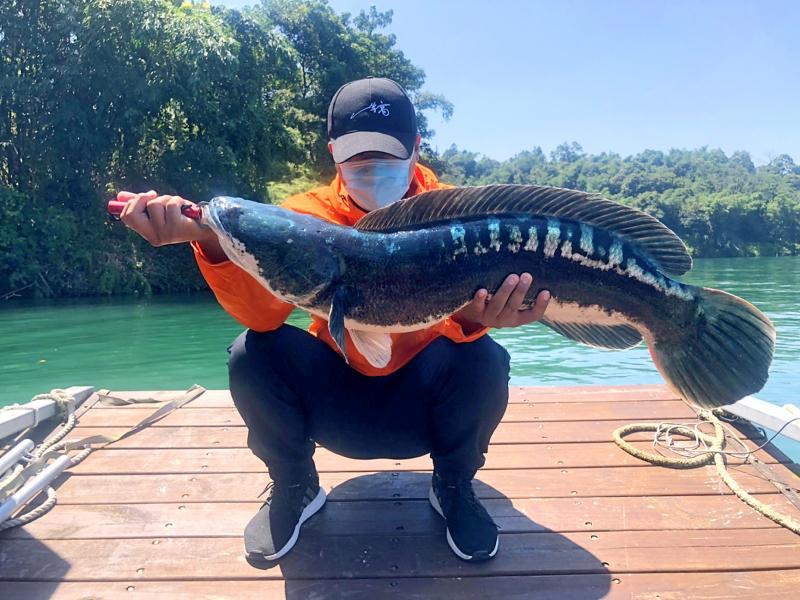Yuchi Township (魚池) fishers have appealed to the Nantou County Government for help in dealing with an invasive fish species in Sun Moon Lake (日月潭), where it has devastated the local ecosystem.
Fishers at Sun Moon Lake have been using electrofishing in an attempt to eliminate the giant snakehead fish — found in Africa and Southeast Asia — but they have struggled to keep up with the growing population of the species, which breeds during September and October, the county government said on Monday.
The county has contacted researchers at National Tsing Hua University, saying it hoped they could come up with a more ecologically friendly and efficient plan to tackle the invasive species, which has been feeding off the lake’s indigenous marine life.

Photo courtesy of the Nantou County Government
Many other invasive species have found their way into Sun Moon Lake in the past few years, including piranhas, gymnochanda (a species of Asiatic glassfish) and the red devil cichlid, it said, adding that the snakehead is especially destructive to the local ecosystem.
“To get rid of snakeheads and their eggs in an ecologically friendly way we are going to use giant mottled eels. They will eat the fish and eggs,” it said.
So far, the fishers have captured about 5,000 snakeheads through three electrofishing attempts, it said.
“We worked with the county and tracked down the areas around the lake where the snakehead fish amass, and found the main area to be around Syuan Guang Temple,” Nantou County Department of Agriculture Director Chen Jui-ching (陳瑞慶) said.
People planning to take part in the annual Sun Moon Lake swimming event on Sunday need not be worried about getting bitten by snakeheads, as the fish are afraid of people and would not come around the large group of swimmers, the county government said.
The county told a news conference on Friday last week that 1,998 teams comprising 21,828 people had signed up for this year’s event.
The participants include 195 foreign nationals living in Taiwan and 171 people with disabilities, it said.
When not swimming, participants will have to wear masks as part of pandemic response measures, it said.
Those failing to comply could be subject to fines of between NT$3,000 and NT$15,000, it said.
Additional reporting by Chang Hsieh-sheng

The Chinese military has built landing bridge ships designed to expand its amphibious options for a potential assault on Taiwan, but their combat effectiveness is limited due to their high vulnerability, a defense expert said in an analysis published on Monday. Shen Ming-shih (沈明室), a research fellow at the Institute for National Defense and Security Research, said that the deployment of such vessels as part of the Chinese People’s Liberation Army (PLA) Navy’s East Sea Fleet signals a strong focus on Taiwan. However, the ships are highly vulnerable to precision strikes, which means they could be destroyed before they achieve their intended

The Taiwan Experience Education Program (TEEP) has funded short-term internships in Taiwan for more than 4,500 young people from more than 40 countries since 2015, with the goal of attracting and retaining international talent, the Ministry of Education said yesterday. Fifty-five colleges launched 514 projects this year, including in fields such as semiconductors, artificial intelligence, medicine and biotechnology, green energy, and sustainability, it said. The program provides research and practical internships in Taiwan for two to six months, and offers cultural exchange and networking opportunities, the ministry said. For example, National Formosa University’s Embedded System and Autopilot Laboratory developed two solar-powered drones in

GLOBAL: Although Matsu has limited capacity for large numbers of domestic tourists, it would be a great high-end destination for international travelers, an official said Lienchiang County’s (Matsu) unique landscape and Cold War history give it great potential to be marketed as a destination for international travelers, Tourism Administration Director General Chen Yu-hsiu (陳玉秀) said at the weekend. Tourism officials traveled to the outlying island for the Matsu Biennial, an art festival that started on Friday to celebrate Matsu’s culture, history and landscape. Travelers to Matsu, which lies about 190km northwest of Taipei, must fly or take the state-run New Taima passenger ship. However, flights are often canceled during fog season from April to June. Chen spoke about her vision to promote Matsu as a tourist attraction in

Taipei resident Mu Chu-hua caught some glimpses of China’s mighty military parade on YouTube on Wednesday. As she watched hypersonic missiles roll down Beijing’s Changan Avenue and troops march in lockstep, she did not feel like they posed a threat to Taiwan. Mu, a 69-year-old retiree, said she saw the parade as simply a way for Chinese President Xi Jinping (習近平) to “say thank you to the troops.” “I thought it was quite normal,” she said. “It was very cool.” China’s military parade commemorating the end of World War II was being watched internationally for insights into Beijing’s military advances and its show